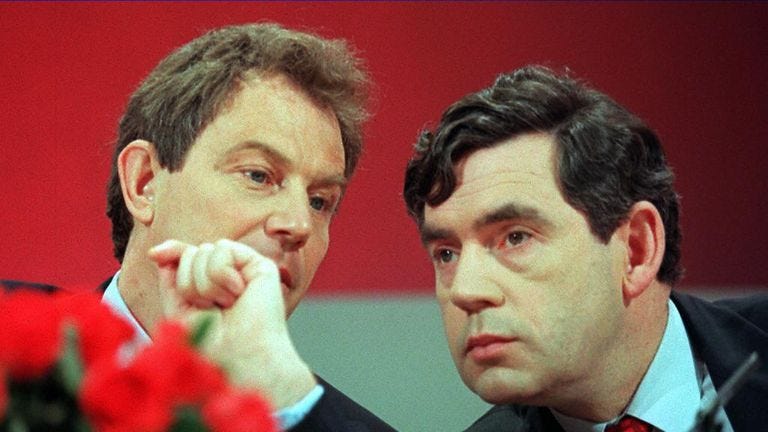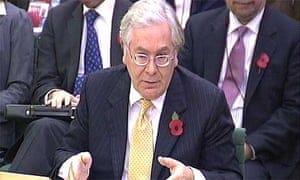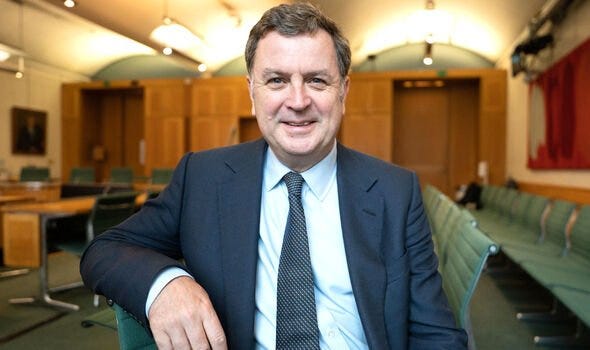Introduction
Last week, I took a deep dive into the history of the parliamentary Select Committees, with a particular focus on the debates in 1979 over the creation of standing committees to scrutinise the work of individual government departments, examining their “expenditure, administration and policy”.
While the Select Committees have few of the powers of similar bodies in the US Congress, where legislation can be amended or blocked, UK Select Committees have the power to send for the “persons, papers and records” of the bodies they are scrutinising and publish reports into their findings. Through these reports they hope to influence both Parliament and Government, as well as inform public opinion.
One of the committees to come out of the 1979 reforms was the Treasury and Civil Service Committee. However, in the time since then, the Treasury Committee (it dropped the Civil Service bit in 1995) has broadened the scope of its inquiries, particularly looking an financial regulation and regulatory bodies, as well as the work of the Bank of England, following its independence from the Government in 1997.
Throughout that process, the Committee has constantly felt that it needed “more teeth” to actually make its reports meaningful — a complaint that is still heard today. And while the Committee has gained more powers — say, reviewing the appointment of Bank of England Monetary Policy Committee (MPC) members — in practice, there has been no meaningful shift towards the more powerful US Congress-style committee.
The real shift has been not in the power of the Select Committee per se but in the creation of more independent non-governmental bodies taking on responsibility for major policy decisions.
The expansion of the role of the Treasury Committee has been in supervising those bodies, as part of a shift of power away from the House of Commons per se.
The Treasury Committee has played a major role in reshaping the financial regulatory environment from the independence of the Bank of England in 1997 to the financial crisis of 2008, influencing the legislative responses to both those events and giving itself more powers over the non-governmental bodies thereby created, from the Monetary Policy Committee to the Office for Budget Responsibility.
New Labour and the expanding Treasury Committee
The Treasury Committee post-1995 was central to the form that Bank of England independence took under the New Labour Government in 1997. Gordon Brown explicitly noted the recommendations of the Committee and in turn gave it more powers in scrutinising the new MPC.
Brown stated that the changes would create “a new openness and accountability in decision-making that involves the Treasury Committee and the House of Commons in a far bigger way than ever before”.

The Treasury Committee’s work also expanded with the 1997 Financial Services and Markets Bill. The Committee was given special scope to conduct unprecedented pre-legislative scrutiny of the Bill, with the Government accepting many of its recommendations before the final Bill was published.
The 1997 Bill itself indirectly furthered the powers of the Committee. One of the most significant aspects of that Bill was the powers it delegated not to the Minister but to the regulator — the Financial Services Authority — which in turn would be scrutinised by the Treasury Committee.
So there was a shift from a system where a Minister was accountable to the House of Commons to a system where a regulator was accountable to a Select Committee.
This is a good example of the withering away of the principle of Ministerial responsibility that Michael Foot warned about in his opposition to the creation of departmental Select Committees in 1979, as we saw last week.
Subsequently, in its 2000 report, the Treasury Committee updated its remit
“to include the smaller departments responsible to the Chancellor of the Exchequer, as well as such organisations as the Bank of England and the Financial Services Authority… [and] other bodies for which Treasury ministers are responsible to Parliament, including the International Monetary Fund (IMF), and the European Union Council of Economic and Finance Ministers (ECOFIN). We also decided that we should take regular evidence from the Financial Services Authority, which was set up by the Government in 1997 and is given its full powers by the Financial Services and Markets Act 2000.”
The Treasury Committee set the precedent that was recognised in the 2002 report of the Modernisation Committee, which sought to update the role of Select Committees by setting out core tasks, including:
“To monitor the work of the department’s Executive Agencies, NDPBs, regulators and other associated public bodies”.
Public interest inquiries and media attention
Beyond the scope of those core tasks, the Committee continued to launch ad-hoc inquiries into public questions that it thought Government and/or regulators should be paying more attention to. And this led the Committee to end up scrutinising the private sector more directly.
For example, reflecting on its 2003 inquiry into the transparency of credit card charges, the Committee noted:
“Although the starting point for the inquiry was the role and actions of government in regulation of the credit and store card industries, much of the focus of the inquiry in practice was a direct engagement with the industry to bring greater pressure to bear on them to improve their practices.”
The Committee prided itself on this more direct approach, which seemed to have a greater impact than the slow, patient work of holding Government departments to account or influencing legislation, boasting that:
“The industry has committed itself to providing more consumer-friendly information about charges”.
This shift also meant cultivating a more direct relationship with the public:
“The response from the public to our raising of these issues revealed a very widespread interest in—and support for—the Committee’s work.”
So there was a move from a relationship of accountability between the Government department (and its subsidiary bodies, including semi-independent financial institutions and quangos) and its departmental Select Committee, to a relationship between the Committee, industry and the public.
That also meant a higher media profile for the Treasury Committee. High-profile hearings, such as those during the financial crisis, garnered media attention and the Committee built a positive reputation among political journalists.
A further consequence of this was the “negative prospect” for politicians, bankers or regulators of having to give evidence in a media spectacle hearing — something which might make them pause while making big decisions and think, “How would I explain that to the Committee?”
From inquiries to preventing another financial crisis
After the 2008 financial crisis, the Government set out to reform financial services regulation in the UK. Subsequently, the Treasury Committee’s reports and evidence sessions played an increasingly important role in financial regulation and legislation.
After the Northern Rock crisis, the Treasury Committee criticised the disfunction of the existing regulatory system, which consisted of a memorandum of understanding between the FSA, the Treasury and the Bank of England, known as the Tripartite.
In a publicity coup, the Committee held a hearing with Alistair Darling, Chancellor of the Exchequer, Mervyn King, then Governor of the Bank of England and Lord Turner of Ecchinswell, then Chair of the FSA, questioning all the major actors overseeing the Northern Rock crisis in a public forum.
The Chancellor subsequently stated that Parliament would await the results of the Committee’s investigations before finalising legislative proposals and it ultimately accepted two out of three of the report’s main proposals.
Claiming a greater public role than simply one of oversight, the Treasury Committee highlighted comments made by the then Governor of the Bank of England emphasising
“the important role that this Committee could play in preventing a repetition of the banking problems that had arisen”.
In 2012, when the coalition Government set up an independent parliamentary review, the parliamentary Commission on Banking Standards (PCBS), following the London Interbank Offered Rate (LIBOR) fixing scandal, six places on the Commission went to current or former Treasury Committee members, and the Treasury Committee’s recommendations had a major influence on the subsequent Financial Services (Banking Reform) Act 2013.
Commenting on the powers developed by the Treasury Committee in this period, particularly with respect to overseeing the Bank of England and appointments to its Monetary Policy Committee, Saskia Rombach has noted:
“The Committee now has become a fixture in the financial regulatory system and continued to build upon this position. In doing so, it also set a precedent for a new sphere of influence for Select Committees in general.”
Veto power over OBR appointments a “game-changer”
In 2010, the Government created the Office for Budget Responsibility — another quango — to produce economic forecasts, based on the information used for the Budget and Autumn Statement.
While the Government like delegating difficult decisions to “non-political” bodies, like the OBR or the independent Bank of England, there are concerns about the oversight of such bodies. As Rombach has politely put it, “quangos are not necessarily objective actors for the public interest”.
A major new power for the Treasury Committee was the ability to veto the appointment or firing of the chair and board members of the OBR. This was intended to insulate the chair of the OBR from the Chancellor’s ire, if they made a decision the Chancellor did not like, and to create a degree of oversight of the OBR by the Treasury Committee.
The Constitution Unit noted that this change was “a decision taken in quite exceptional circumstances” and the Liaison Committee called it “a game-changer” for Select Committees.
While some insisted that the exceptional circumstances meant that power should remain a one-off, others have called for similar powers to be extended to other Select Committees.
Turning to more recent events…
The turmoil in the Treasury over the past 12 months has raised the profile of the Treasury Committee once more, both in Parliament and in the media.
When Kwasi Kwarteng and Liz Truss burst on to the scene last September, they were subtly questioning a lot of the “orthodoxies” that have been central to the growth in power of the Treasury Committee: the independence of the Bank of England and the economic forecasts of the OBR.
And, arguably, the Treasury Committee played a not insignificant role in their downfall after their “mini-Budget” got some bad reviews.
Mel Stride — who, let’s not forget had been a prominent supporter of the recently defeated Rishi Sunak and himself a former Treasury Minister overlooked by the new Tory leadership under Truss — wrote to Kwarteng as Chair of the Treasury Committtee insisting that
“in line with the Committee’s previous recommendation, if this announcement involves any major changes to the rates of existing taxes or the introduction of new taxes, it will be in a fiscal event accompanied by an OBR forecast.”
And, when Kwarteng duly ignored his request, Stride then proceeded to use this as a battle cry around which to muster opposition within the Conservative party to Kwarteng and Truss.
Although publishing the OBR report was not a statutory requirement, a “recommendation” by the Treasury Committee clearly holds a lot of sway.
Within a month, Truss and Kwarteng were gone, Sunak had been anointed PM and — surprise, surprise — Mel Stride found himself with a Cabinet position, appointed Secretary of State for Work and Pensions.
That left the Chair of the Treasury Committee vacant — and it was taken up by Conservative MP Harriet Baldwin (who had contested the spot back in 2019 but lost out to Stride).
Baldwin has immediately faced the inflation crisis and the role of the Bank of England in handling it.
For all the insistence on the independent economic forecasts of the OBR, which played a role in the crisis last autumn, the inflation crisis has shown again and again, through Baldwin’s inquiries, that forecasting is not a sure science.
Baldwin has not held back, telling Andrew Bailey, Governor of the Bank of England, in June: "Something has gone really wrong with your modelling".
With the latest hike in interest rates coming during the parliamentary recess, there has been no Treasury Committee hearing to scrutinise Bailey on the MPC’s latest decision.
The big question now is how big the impact of sustained, consecutive raises in interest rates has been on the economy. Will the Bank have forced the economy into a recession? Will the mysteriously stubborn core inflation remain? Will the Bank start to reverse interest rate rises if there is the first sign of panic?
The evidence will start to trickle through from September, and the Treasury Committee hearings will be centre stage.






